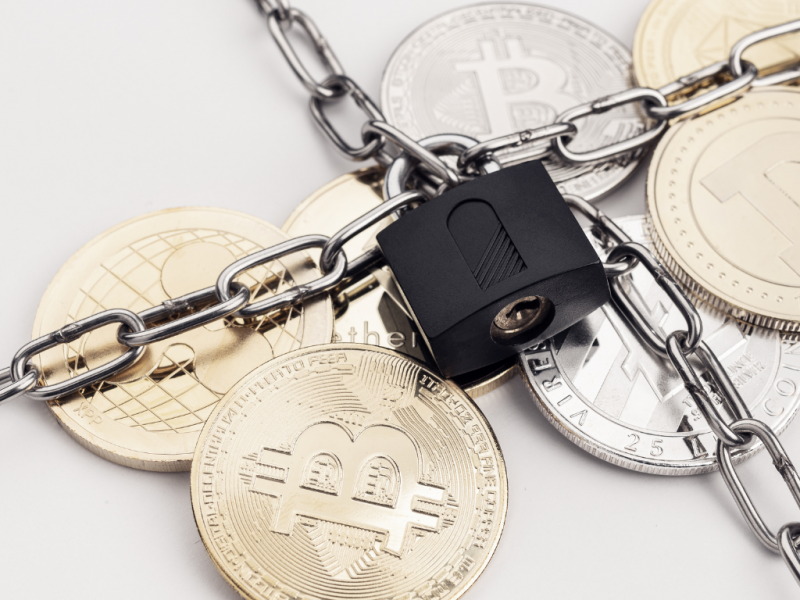01 Sep 12 Ways to Keep Cryptocurrency Safe from Hackers

A concern for many people new to digital assets is how to keep cryptocurrency safe from hackers. It’s a valid concern.
Cryptocurrency was built on the idea of decentralization and self-reliance. This means it’s up to you to protect your information and your crypto assets.
There’s no bank teller you can call if you accidently send crypto to the wrong address or your computer gets a virus created to steal Bitcoin.
And there’s no centralized customer service support available if you lose the recovery phrase to your hardware wallet.
This might scare off some people, but it shouldn’t. If you know what to do, it’s pretty easy.
Keep reading for 12 ways to keep cryptocurrency safe from hackers.
#1 Use a VPN
A VPN (or virtual private network) encrypts your internet traffic and creates a secure connection to another network over the internet. It hides your IP address, allowing you greater online anonymity.
I’d recommend staying away from free VPNs because many have been known to sell
data and leak identity.
Also, make sure that the VPN you select doesn’t store user logs because they may be matched to your traffic.
Personally, I use ExpressVPN. It takes a few minutes to set up, and you don’t have to be a tech geek to work it.
#2 Select Passwords Wisely
This is an obvious one, but too many of us like to pick easy-to-remember passwords or use the same password for multiple accounts. Not a good idea.
When creating strong passwords, use a combination of letters, numbers, and symbols.
Don’t select passwords that contain personal information such as an anniversary date, birthday, or your kids’ (or pets’) names.
Better yet, use a secure password manager like LastPass.
#3 Use a 2-Factor Authentication Code
Two-factor authentication (2FA) adds an extra layer of security to your crypto activities.
Instead of receiving an authentication code via SMS or email when you log into an exchange or want to transfer crypto, you’re given a one-time 6-digit password that only you can access through an authentication app.
This 6-digit password changes every 30 seconds and makes it very difficult for hackers to get into your account.
I recommend downloading either Duo or Authy. Both are available on Android and IoS.
To set this up, all you need to do is log into your crypto exchange platform and locate the “Two Factor Authentication” section, typically under security settings.
From there, you’ll need to scan the provided QR code in the authentication app on your phone to link it with your exchange account.
Once it’s in place, you’ll be asked to log into the authentication app every time you log in. It’s that easy.
#4 Use a Secure Email Service for Crypto Activities
While it’s easy to use your normal email address to sign up for an exchange or set up a wallet, it’s not the best idea.
For example, if you use Gmail, you’ve given Google permission to read your emails and track your activity even if you exit Gmail.
Tracking like this may put your information (including your login info) at risk of getting hacked.
I recommend using ProtonMail – it’s safe and secure, and they don’t track your activity.
#5 Avoid Public WiFi
Waltzing into your favorite coffee shop and using an unsecure Wi-Fi network to buy and sell crypto is dangerous.
Avoiding it altogether is one of the easiest ways to keep cryptocurrency safe from hackers.
It’s the perfect opportunity for cyber criminals to try and infect your network with viruses, worms, or other types of malware. And steal your information.
It’s also dangerous because the network host may have rules you’re not aware of and may even collect data that you access on your computer or phone.
Avoid accessing crypto funds from public Wi-Fi. If you absolutely need to, use a VPN.
#6 Don’t Store Cryptocurrency on an Exchange
Whether you use Gemini, Coinbase, Kraken, or any other exchange, don’t think your crypto is safe sitting there.
Exchanges have vulnerabilities, and criminals know this. If you leave your crypto on an exchange, the safety of your funds are in the hands of the exchange owners — not you.
In 2019, 12 crypto exchanges were hacked. According to CoinTelegraph, “In total, $292,665,886 worth of cryptocurrency and 510,000 user logins were stolen from crypto exchanges in 2019.”
2020 was no better. In fact one of the largest exchange hacks happened on September 25, 2020, when hackers stole more than $275 million of cryptocurrency from the KuCoin exchange.
The solution is to store your crypto in a secure personal wallet that only YOU have access to.
[Related Read: Types of Crypto Wallets: A Beginner’s Guide]
#7 Get a Hardware Wallet
One of the best ways to keep cryptocurrency safe from hackers is to get a hardware wallet.
Hardware wallets, or cold storage wallets, are physical devices that you can hold in your hand.
They are a USB-drive-looking thing with a screen and buttons. They are typically batteryless, and you can plug them into your computer or phone to charge.
The best part about hardware wallets is that they mitigate risks of your crypto being attacked online because your personal key is stored on the device and the device is not connected to the internet.
When you set up a hardware wallet, you must set up a PIN to protect your device and a recovery phrase to use should you lose your wallet.
(Another reason I love hardware wallets – you can retrieve your cryptocurrency if you have your PIN code and recovery / seed phrase.)
Hardware wallets are a good idea to have if you hold large amounts of crypto or you plan on holding coins for a long time.
Or they are great if you just want to protect your crypto investments.
While hardware wallets are one of the most secure, that doesn’t mean they can’t be attacked by hackers.
If you don’t set up the wallet properly or if you fall prey to a phishing scam, you can have your wallet emptied.
#8 Have Multiple Wallets
Another way to keep cryptocurrency safe from hackers is to have multiple wallets.
Divide up your crypto assets among multiple wallets so, if funds are stolen from one, you’ll still have some assets.
(Note: you can avoid this altogether if you never ever give out your personal keys and recovery / seed phrases to anyone.)
Wallets aren’t cheap, but are worth the investment especially if you hold large amounts of crypto.
#9 Manually Update Wallet Software
If you have your wallet set up to automatically update the new release of software, disable it.
While you want to update your wallet to protect you from the latest security threats, you don’t want the latest version right away. Wait a few days or a week to let the bugs get worked out.
#10 Never Ever Share Your Recovery / Seed Phrase
A seed phrase, also known as a recovery phrase, is a mnemonic phrase you set up during installation of a crypto wallet. It’s a list of 12, 18, or 24 words that store the info needed to recover your wallet.
If your hard drive crashes, you lose your hardware wallet or it’s damaged or stolen, or you forget your password, you simply use the recovery phrase to recover your funds.
No wallet company will EVER ask for your seed / recovery phrase.
#11 Be on High Alert for Phishing Scams
Phishing is when criminals “fish” for personal info by sending individuals emails asking for personal information, such as user names, passwords, or other private account information.
Here’s how this works: You receive an email or text from a company that asks you to click on something that takes you to a fake website to update information or take some specific action.
If you do as they ask, you are unknowingly giving hackers your private details…and your crypto.
Be cautious – if something looks suspicious, do not click on it. Go to ScamAlert and check out recent scams and submit a report.
#12 Keep Up to Date on Crypto Scams
The last way to keep cryptocurrency safe from hackers is to stay up to date on the latest crypto news.
- Monitor popular crypto forums.
- Sign up for Trezor or Ledger newsletters, as they do a great job of updating customers on scams and breaches.
- Follow @Whale_Alert on Twitter.
In July 2020, Ledger Wallet had a security breach where mainly email addresses of wallet owners were stolen.
They immediately reported this to customers, announced on social media and in various media outlets, and fixed the breach.
Leger continues to update customers and the public and is asking people to report phishing.
Since the breach, they have taken down more than 170 phishing websites and are working with law enforcement and prosecutors.
However, many Ledger users fell victim to these phishing scams because they weren’t paying attention to the news and communications coming from Ledger.
The lesson: stay vigilant and stay up to date.



Pingback:Types of Crypto Wallets: A Beginners Guide - Stop Being Sold
Posted at 15:31h, 20 September[…] If you’re keeping your Bitcoin, Etherium, or alt coins on an exchange, its time to invest in a crypto wallet to protect your assets!” […]
Pingback:7 Crypto Staking Risks [Investors Beware] - Stop Being Sold
Posted at 18:46h, 18 April[…] with any asset or investment, your crypto assets are vulnerable to theft or […]